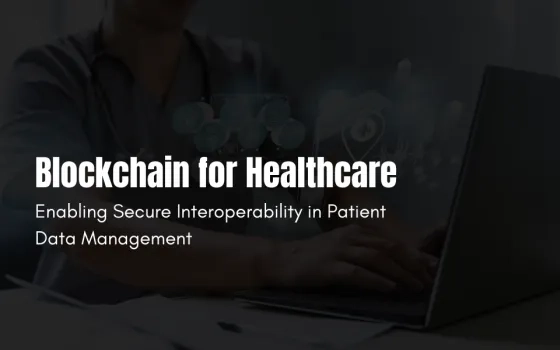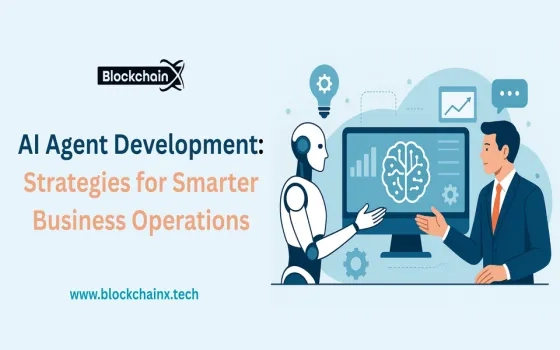Introduction
The healthcare industry stands at a critical juncture where data-driven innovation is reshaping the delivery of care. Patient records, clinical research data, insurance details, and medical histories have become the lifeblood of modern healthcare systems. However, the lack of interoperability, persistent data silos, and concerns over security and compliance create significant barriers to progress.
This is where blockchain technology emerges as a transformative force, offering a decentralized framework to ensure secure, transparent, and interoperable patient data management. For healthcare enterprises, leveraging Blockchain Development Services presents a strategic pathway to build resilient and future-ready systems.
The Challenge of Healthcare Data Interoperability
Healthcare organizations often operate in fragmented environments, where electronic health records (EHRs) are scattered across multiple systems, providers, and platforms. This fragmentation makes it challenging to maintain the accuracy, accessibility, and timeliness of patient data. Traditional integration models rely on intermediaries, which can result in inefficiencies, delays, and vulnerabilities.
As patient care increasingly spans multiple institutions, the demand for a unified, tamper-proof, and accessible data-sharing mechanism is more pressing than ever. Blockchain addresses this gap by providing a decentralized ledger that eliminates the need for centralized authorities while ensuring transparency and immutability.
Blockchain as the Foundation of Secure Patient Data Exchange
Blockchain offers a distinct approach to data management, where every transaction is validated, encrypted, and stored across a decentralized network. In healthcare, this translates into unparalleled security for patient records. Instead of storing data in a single vulnerable location, blockchain distributes encrypted data fragments across multiple nodes, thereby reducing the risk of breaches. For organizations seeking Blockchain Development Services, the potential lies not only in creating secure frameworks but also in enabling auditable and regulatory-compliant exchanges of sensitive patient data.
By creating a trusted ecosystem, blockchain empowers healthcare providers, insurers, and patients to access and share data without compromising integrity. The immutable nature of blockchain ensures that once information is recorded, it cannot be altered, thus preserving accuracy in clinical decision-making and billing processes.
Enhancing Patient-Centric Healthcare Systems
At its core, blockchain brings the patient back into focus. Traditional data ownership models often place patient records under the control of hospitals, clinics, or insurance providers. Blockchain shifts this paradigm by giving patients ownership and access rights to their health information. This patient-centric approach allows individuals to grant permissions selectively, ensuring their data is used responsibly for treatment, research, or insurance claims.
Healthcare organizations that leverage blockchain development services can build platforms that enable patients to securely manage their own medical records, thereby reducing administrative friction and enhancing trust among stakeholders. Moreover, such systems reduce the duplication of tests and procedures, resulting in significant cost savings while improving the quality of care.
Regulatory Compliance and Auditability
Healthcare enterprises operate under stringent compliance frameworks, such as HIPAA in the United States and GDPR in Europe, as well as similar regulations globally. Non-compliance can lead to severe legal and financial consequences. Blockchain provides a robust foundation for regulatory adherence by ensuring data traceability and secure audit trails. Every access, modification, or transfer of data is recorded on the blockchain, making it transparent and tamper-proof.
For enterprises, this means compliance can evolve from being a costly obligation to becoming an integral part of their digital infrastructure. Engaging a trusted Blockchain Development Services partner enables organizations to align with regulations while innovating without fear of penalties or data mishandling.
Interoperability Across Healthcare Ecosystems
One of the biggest hurdles in healthcare is the inability of different systems to communicate effectively with each other. EHR systems, insurance databases, and research platforms often lack compatibility, leading to inefficiencies in patient care. Blockchain creates a universal framework for interoperability by standardizing access protocols and data formats. This ensures that medical histories, lab results, imaging data, and prescriptions can seamlessly flow across providers and platforms without redundancy.
For example, a patient moving from one hospital to another can grant access to their medical blockchain profile, allowing doctors to review accurate and complete medical histories instantly. This level of interoperability not only improves treatment outcomes but also accelerates emergency response and the management of chronic care.
Integrating Blockchain with Emerging Technologies
Blockchain becomes even more powerful when integrated with other digital innovations. Artificial intelligence, for instance, thrives on clean, secure, and diverse datasets. Blockchain ensures the quality and integrity of these datasets, enabling AI algorithms to deliver reliable insights for diagnostics, drug discovery, and treatment personalization.
Healthcare businesses often partner with a Python software development company to create AI-driven analytics platforms that work seamlessly with blockchain-powered data repositories. Python’s versatility in building predictive models and machine learning pipelines makes it an ideal companion technology. Similarly, the Internet of Medical Things (IoMT) can be enhanced through blockchain, where wearable devices and remote monitoring systems feed tamper-proof patient data directly into healthcare ecosystems.
By combining blockchain with these technologies, enterprises unlock the potential for precision medicine, faster drug development, and improved operational efficiency.
Blockchain in Clinical Trials and Research
Clinical trials often suffer from inefficiencies, a lack of transparency, and challenges in data verification. Blockchain provides a secure mechanism for recording trial data, ensuring its integrity throughout the process. From informed patient consent to trial results, every step can be validated and stored in a tamper-proof manner. This not only accelerates the research process but also builds public trust in clinical findings.
Healthcare organizations that engage with blockchain development services can utilize blockchain-based platforms to streamline collaborations with research institutions, pharmaceutical companies, and regulatory authorities. With verifiable and immutable data records, disputes over trial results or data handling are significantly minimized.
Building Resilient Insurance Systems with Blockchain
Fraud, delays, and administrative burdens often plague insurance processes in healthcare. Blockchain streamlines these systems by automating claims management through the use of smart contracts. These self-executing contracts automatically validate conditions and trigger payments when terms are met, reducing manual intervention and errors.
For patients and providers, this means faster reimbursements, reduced disputes, and enhanced transparency. For insurers, blockchain reduces fraudulent claims and ensures efficiency across the ecosystem. Engaging with blockchain development services enables insurers to build next-generation platforms that restore trust and enhance customer satisfaction.
Future Outlook: Blockchain as the Backbone of Healthcare Interoperability
The adoption of blockchain in healthcare is still in its early stages, but its potential is undeniable. As enterprises explore Blockchain Development Services, the emphasis will shift toward creating large-scale interoperable networks that connect hospitals, insurers, research institutions, and regulators. This vision envisions a future where healthcare ecosystems operate as a unified whole, with data flowing securely and efficiently across all stakeholders.
Collaboration with digital technology experts, such as a Python software development company, will play a crucial role in this transition. These partnerships enable healthcare businesses to design scalable blockchain solutions integrated with AI-driven analytics, IoMT, and cloud-based systems. The result will be more connected, secure, and patient-centric healthcare infrastructures.
Conclusion
Blockchain is not just an emerging technology for healthcare—it is a foundational shift in how patient data is managed, shared, and secured. By enabling interoperability, enhancing compliance, and fostering patient-centric systems, blockchain holds the key to resolving long-standing challenges in healthcare data management.
Enterprises that adopt Blockchain Development Services are well-positioned to lead this transformation, unlocking efficiencies and fostering trust within their ecosystems. As the industry continues to evolve, integrating blockchain with complementary technologies like AI and IoMT will ensure that healthcare remains not only innovative but also resilient, transparent, and secure.



















